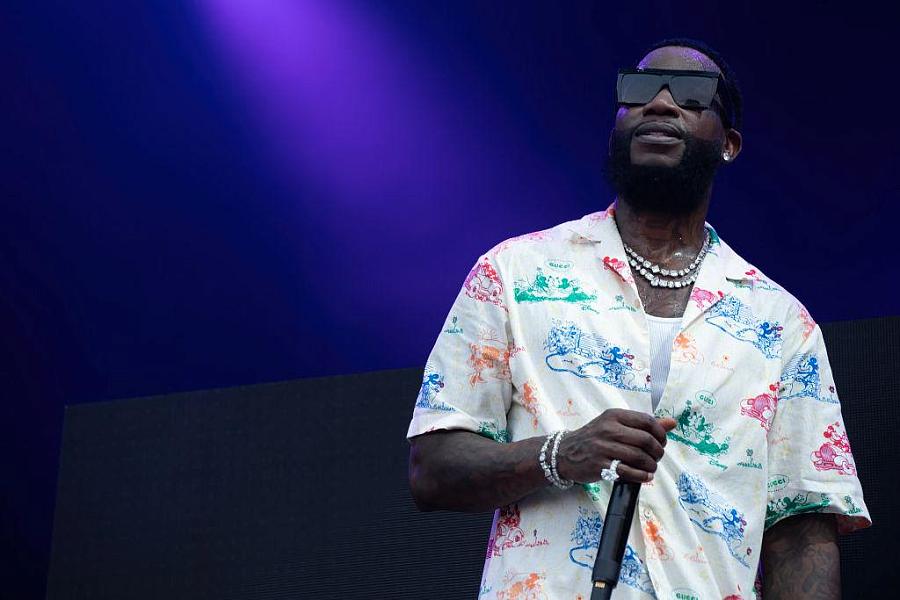The Health Divide: This artist broke the silence on schizophrenia, but the stigma still silences others
Image

Hip hop artist Gucci Mane performs in Dallas, Texas last year.
(Photo by Eugenia R. Washington/WireImage)
Published on
November 10, 2025
In the music industry, Gucci Mane is a complex figure.
He is a celebrated hip-hop mogul and a trailblazer in the trap music genre. Over his career, he has released 12 studio albums and 70 mixtapes, with a reported net worth of $14 million.
But he is also known for his frequent run-ins with the law, which include numerous arrests and violent outbursts. One incident involved him allegedly striking a fan in the head with a champagne bottle at a club.
While many fans see his behavior as outlandish, those incidents point to a deeper mental health struggle. Mane discussed his struggles with schizophrenia during a recent interview on the nationally syndicated morning radio show "The Breakfast Club." Alongside his wife, he openly discussed the factors that led to his breakdowns — exacerbated by drug use and stress — and how they cope with these challenges.
The conversation was significant for the Black community, where mental health is rarely addressed in such a personal and open forum because of the persistent stigma surrounding mental health care. It also highlighted how schizophrenia disproportionately affects African Americans, and how marginalization and trauma are recognized as risk factors for developing the condition or experiencing episodes.
But while Mane's openness about his mental health struggles is impactful, his wealth and fame shield him from the stigma those who lack celebrity status often face.
“Mane can openly discuss his mental health struggles, and people will applaud his honesty,” said Dr. Kweku Ramel Smith, a Milwaukee psychologist who is Black. “However, if I were to do the same without his level of fame, I would probably face judgment, with people calling me ‘crazy’ or worse. This is the conversation we need to have.”
Big disparities, and a lack of mental health providers
Studies have found that African Americans are two to three times more likely to be diagnosed with schizophrenia than other groups, but researchers and clinicians agree that the disparity reflects a bias in diagnosis, not a higher prevalence of the condition.
A doctor of a different race assessing a Black patient may overlook cultural traits, which can lead to mistrust and make Black individuals less willing to discuss their symptoms. The shortage of Black and Hispanic mental health professionals is a well-known barrier to treatment for communities of color. In 2020, 84% of psychologists were white, while white Americans made up about 58% of the population.
Black psychologists accounted for just 4% of the total, despite Black Americans representing 13% of the population. Similar disparities are seen in other groups: Hispanic or Latino psychologists made up 6%, although this group comprises 19% of the population. Only 3% of psychologists identified as Asian, while Asians represent 6% of the U.S. population.
There is similarly a significant shortage of mental health providers who offer culturally responsive care for people identifying as LGBTQIA+. A survey revealed that more than half of LGBTQIA+ individuals experienced various forms of bias and discrimination when seeking treatment. As a result, many do not receive the care they need, including over half of LGBTQIA+ youth, according to a KFF issue brief.
The shortage of therapists of color and those from underrepresented and marginalized communities is worsening. Today, 150 million Americans live in federally designated “mental health professional shortage areas.”
The persistent shortage of care can make it easy to miss worrying signs from those who may be suffering from mental health disorders.
In 2011, Mane got a tattoo of an ice cream cone on his face. While many saw it as a marketing stunt, he described it as a cry for help. After entering rehab in 2013 and serving time in 2014, with support from his wife, professional mental health treatment, and strict medication management, he emerged in 2016 as a changed man.
A field slow to change
Smith, the Milwaukee psychologist who also provides services for the U.S. Olympic and Paralympic Committee, noted that the field of psychology was developed mainly by white male scientists operating within a framework that has been slow to evolve.
In the early development of psychological theory, harmful stereotypes promoted the idea that Black people were inferior in character, intelligence, and temperament. Psychologists often viewed deviations from white norms as deficient or pathological.
For example, early family therapy models pathologized the structures of Black families when they differed from the ideal of the white nuclear family. These models failed to recognize the unique strengths of Black families, such as their extended kinship networks and strong emphasis on spirituality. The field has also long ignored the broader systemic nature of racism and its impact on mental health.
Smith said open discussion of mental health challenges and needs is still a liability for many in the Black community. "It's already challenging for us to secure employment,” he said. “Studies indicate that a Black man with a college degree is more likely to be overlooked for a position in favor of a white man without a degree, and revealing a mental health issue makes it even harder. This is why many people are hesitant to speak out about their mental health problems."
Health journalists often highlight the stigma around mental illness, and sharing personal stories like Gucci Mane's can help foreground this issue in a way that lessens some of that stigma.
Many people with mental health struggles have significant stories to share, whether they are former athletes, church deacons, stressed parents, or college students afraid to speak up about their challenges.
Highlighting these different perspectives in our coverage and giving people a voice can not only help them but also aid thousands of others who continue to suffer in silence. Raising awareness helps reduce stigma, and can inspire those suffering to seek help.

